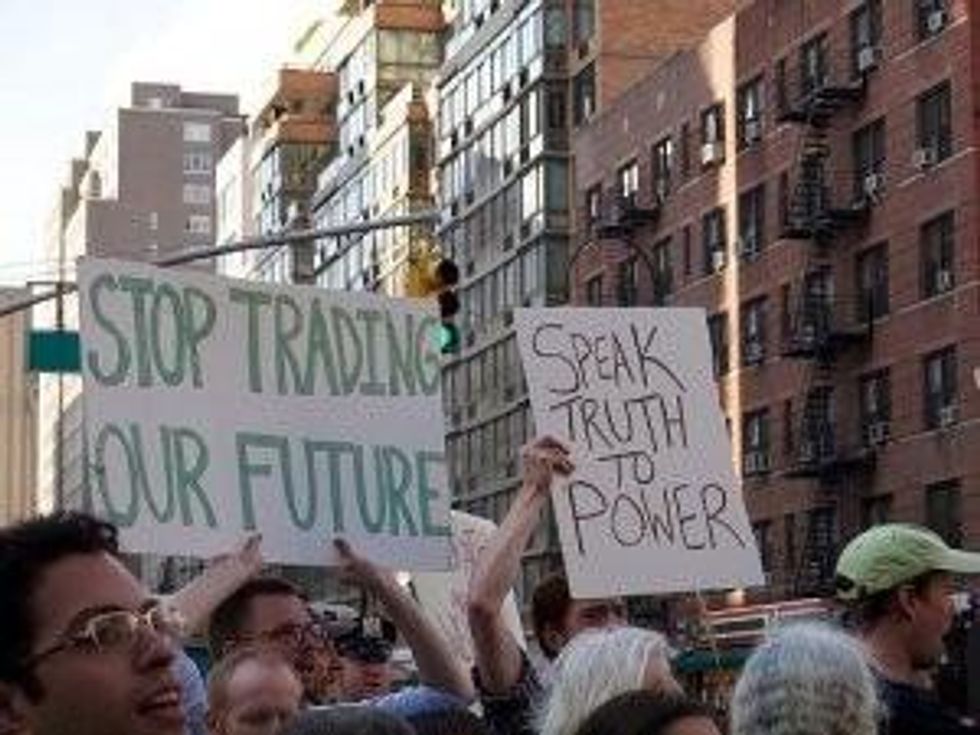The big flaw in the Occupy Wall Street movement ever since it began some three weeks ago has been that the actual proposals for action demanded by its members have largely been incoherent, confused and self-contradictory.
This is still true. Suddenly, though, this defect has lost its potency. Almost overnight, the movement has begun to gain respect, even from its opponents.
Thus, a week ago Eric Cantor, majority leader of the Republicans in the House of Representatives, dismissed the protestors as "an angry mob." He now admits, "there is growing frustration across the country," adding that this anger is "warranted."
Two factors explain the change. The first is that the protestors haven't done what many of their neo-conservative opponents undoubtedly hoped they would. They haven't protested physically. Only verbally, and often with humour.
No violence, that is to say, and no disorder. Indeed, at New York's Zuccotti Park, which has become the centre of what is now a worldwide movement, an extraordinary exercise in self-government is taking place. Food, toilets, medical care, books and magazines to read, tents, warm clothing, have all somehow been organized for a gathering of people almost all of them strangers to each other.
The other factor is more profound. If the protestors haven't yet come up with any credible cures, they have diagnosed exactly the nature of the problem itself. It's not a matter of some brave new economic or financial policy. Instead, it's a matter of reverting to something very old-fashioned: morality.
The best expression of this was contained in an editorial in the Financial Times. It informed its readers (most of them themselves exceedingly well-suited) that: "The fundamental call for a fairer distribution of wealth cannot be ignored."
It continued: "The (American Dream) has been shattered by a crisis brought about by financial excess and political cynicism." The result, declared the Financial Times, "has been growing inequality, rising poverty and sacrifice by those least able to bear it."
To confirm that every word in those sentences is accurate is easy -- sadly:
* In the U.S. over the last 30 years, the top 10 per cent of income earners have taken all of the income gains, and then more, so that the entire bottom 90 per cent has undergone a net loss.
* The top 1 per cent of Americans now possess more wealth than do all the members of that same 90 per cent.
And on the other side of the ledger:
* More Americans (46 million) are now living in poverty than at any time since records were first taken more than 50 years ago.
In the days when Occupy Wall Street was still an easy target, Mitt Romney, the leading candidate for the Republican presidential nomination, accused the protestors of engaging in "class warfare."
Even in detail, Romney had got it wrong. The real war going on now is that between the generations. It's the young who will pay the price for the bailouts of bankers that they promptly turned into bonuses for themselves. This is the accumulation of behaviour and attitudes that a Judge Richard Holwell described while sentencing an insider trader to 11 years in jail as, "a virus in our business culture."
As the weather gets chillier and as many of those taking part have to leave for other pursuits -- such as trying to find a job -- it's likely that the Occupy Wall Street movement will fade away, as populist movements commonly do.
What will remain will be the memory of the magic moment when vast numbers of ordinary people were able, somehow, to say simultaneously that the emperor has no clothes.
Afterwards will come the hard part of convincing those same ordinary people to again believe in the American Dream.



